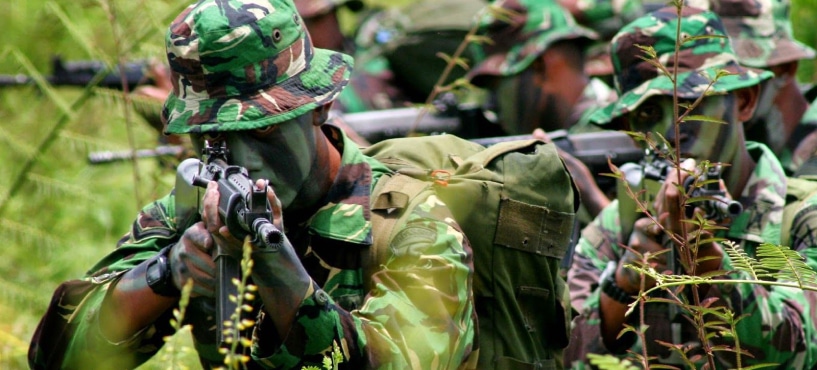Bali, known worldwide for its serene beaches, vibrant culture, and spiritual heritage, also has a significant military presence that plays a crucial role in maintaining security and stability on the island. While the island is predominantly associated with tourism and culture, the military’s presence ensures the safety of both residents and visitors. This article explores the history, roles, and current influence of the military in Bali, highlighting its importance in the broader context of Indonesian defense and security.
Introduction
Bali, a province of Indonesia, is not only a tourist paradise but also an important strategic location for Indonesia’s national defense. The military presence in Bali is part of the Indonesian National Armed Forces (TNI), which includes the Army, Navy, and Air Force. This article provides an in-depth look at the historical development, current roles, and future prospects of the military in Bali.
Historical Background
Colonial Era
The military history of Bali dates back to the colonial era when the island was under Dutch rule. The Dutch established a military presence to control and pacify the local population, who resisted colonial rule through various uprisings.
- Military Campaigns: The Dutch conducted several military campaigns in the 19th and early 20th centuries to subjugate Bali, culminating in the Puputan (mass suicides) of Balinese royalty and warriors.
- Colonial Garrison: The Dutch established garrisons to maintain order and suppress resistance, influencing the militarization of the region.
Post-Independence Era
After Indonesia gained independence in 1945, Bali became an integral part of the new republic. The Indonesian National Armed Forces (TNI) established a presence on the island to ensure national sovereignty and security.
- Military Integration: The integration of local militias and freedom fighters into the TNI helped solidify military presence in Bali.
- Rebellions and Conflicts: The military played a key role in quelling regional rebellions and conflicts during the early years of Indonesian independence.
Roles and Responsibilities
Maintaining Security
The primary role of the military in Bali is to maintain security and stability. This includes preventing and responding to internal and external threats.
- Counterterrorism: The military works alongside the police to combat terrorism, particularly in the wake of incidents like the 2002 Bali bombings.
- Border Security: Ensuring the security of Bali’s coastline and maritime borders is crucial to prevent smuggling, illegal fishing, and other transnational crimes.
Disaster Response
Bali is prone to natural disasters such as earthquakes, volcanic eruptions, and tsunamis. The military plays a vital role in disaster response and relief efforts.
- Humanitarian Assistance: The military provides essential humanitarian assistance during disasters, including search and rescue operations, medical aid, and the distribution of supplies.
- Coordination: Military forces coordinate with local government and international aid organizations to ensure effective disaster management and recovery.
Supporting Public Order
The military often assists in maintaining public order during large events, protests, and other situations that require enhanced security measures.
- Event Security: Military personnel provide security for major events such as international conferences, cultural festivals, and high-profile visits.
- Civil Unrest: In times of civil unrest or large-scale protests, the military may be called upon to support police forces in maintaining order.
Key Military Installations
Army Bases
The Indonesian Army maintains several bases in Bali, which serve as operational centers for ground forces.
- Strategic Locations: Army bases are strategically located to respond quickly to security threats and natural disasters.
- Training Facilities: These bases often include training facilities where soldiers receive specialized training in various disciplines.
Naval Presence
Bali’s strategic maritime location necessitates a strong naval presence to secure its waters and coastline.
- Naval Bases: The Indonesian Navy operates bases in Bali, which support naval patrols, search and rescue missions, and maritime security operations.
- Coast Guard Collaboration: The Navy collaborates with the Indonesian Coast Guard to ensure comprehensive maritime security.
Air Force Installations
The Air Force has installations in Bali to support air operations, including surveillance, transport, and disaster response.
- Air Bases: These bases facilitate the deployment of aircraft for various missions, including humanitarian aid and search and rescue.
- Rapid Response: Air Force units in Bali are capable of rapid deployment to respond to emergencies and security threats.
Contemporary Challenges and Issues
Security Threats
Bali faces various security threats, ranging from terrorism to organized crime. The military’s role is crucial in addressing these challenges.
- Terrorism: The threat of terrorism remains a significant concern, particularly in light of past attacks. The military works to prevent such incidents through intelligence and security operations.
- Transnational Crime: Bali’s proximity to international waters makes it vulnerable to transnational crimes such as human trafficking and drug smuggling.
Balancing Tourism and Security
Ensuring the safety of tourists while maintaining a welcoming environment is a delicate balance for the military in Bali.
- Visible Presence: A visible military presence can reassure tourists, but it must be balanced to avoid creating a sense of unease.
- Collaborative Efforts: The military collaborates with local authorities and the tourism industry to implement security measures that do not disrupt the island’s appeal.
Community Relations
Maintaining positive relations with the local community is essential for the military’s effectiveness and acceptance.
- Community Engagement: The military engages in community outreach programs to build trust and foster cooperation with local residents.
- Respect for Culture: Sensitivity to Balinese cultural practices and traditions is crucial for harmonious relations between the military and the community.
Future Prospects
Modernization and Training
The Indonesian military, including its forces in Bali, is undergoing modernization efforts to enhance capabilities and readiness.
- Equipment Upgrades: Investment in modern equipment and technology is aimed at improving operational effectiveness.
- Training Programs: Enhanced training programs focus on disaster response, counterterrorism, and other critical areas.
International Cooperation
Collaborating with international partners enhances Bali’s security and disaster response capabilities.
- Joint Exercises: Participation in joint military exercises with other countries helps improve interoperability and readiness.
- Knowledge Exchange: Sharing best practices and knowledge with international partners contributes to the continuous improvement of military operations in Bali.
Conclusion
The military in Bali plays a vital role in maintaining the island’s security and stability, ensuring the safety of both residents and tourists. From historical roots to contemporary challenges, the military’s presence in Bali reflects its importance in the broader context of Indonesian defense. As Bali continues to evolve, the military will remain a key player in balancing security with the island’s cultural and economic vitality. Through modernization, community engagement, and international cooperation, the military in Bali will continue to adapt and respond to the dynamic security landscape of this unique and beautiful island.





